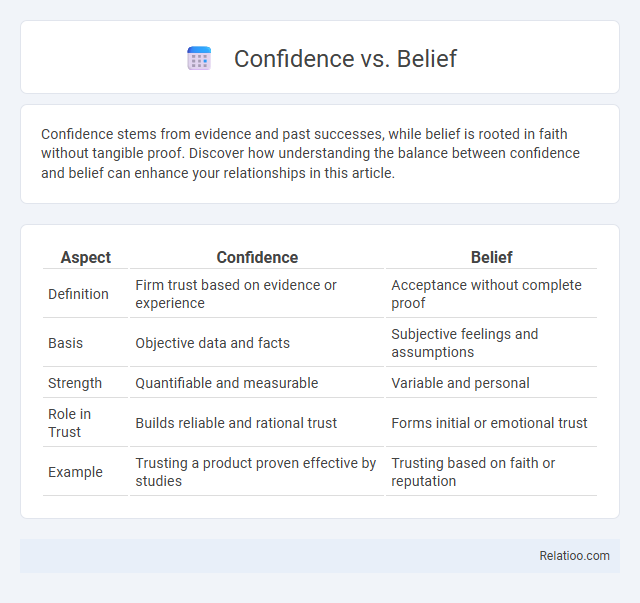Confidence stems from evidence and past successes, while belief is rooted in faith without tangible proof. Discover how understanding the balance between confidence and belief can enhance your relationships in this article.
Table of Comparison
| Aspect | Confidence | Belief |
|---|---|---|
| Definition | Firm trust based on evidence or experience | Acceptance without complete proof |
| Basis | Objective data and facts | Subjective feelings and assumptions |
| Strength | Quantifiable and measurable | Variable and personal |
| Role in Trust | Builds reliable and rational trust | Forms initial or emotional trust |
| Example | Trusting a product proven effective by studies | Trusting based on faith or reputation |
Understanding Confidence and Belief
Confidence is the measurable assurance in one's abilities or knowledge, often based on experience and evidence, while belief refers to the acceptance of a proposition or idea without the necessity of proof. Understanding confidence involves recognizing its grounding in competence and data, whereas belief is more subjective and influenced by personal values or spiritual convictions. Differentiating these concepts is crucial for decision-making, as confidence drives actions supported by skills, whereas belief shapes perspectives beyond empirical validation.
Defining Confidence: Key Characteristics
Confidence is a state of assuredness rooted in evidence-based skills and experience, distinguishing it from belief, which relies more on acceptance or faith without proof. Key characteristics of confidence include a realistic self-assessment, resilience in facing challenges, and the ability to act decisively despite uncertainty. Your confidence grows by consistently validating your abilities through successful practice and reflective learning.
What Constitutes Belief?
Belief constitutes a mental attitude where an individual holds a proposition or premise to be true, often without requiring direct evidence or proof. It differs from confidence, which reflects the degree of certainty or trust in the accuracy of that belief, and from knowledge, which is justified true belief supported by evidence. Understanding belief involves examining psychological and epistemological factors that influence how individuals accept propositions as true within various contexts.
The Psychological Foundations of Confidence
Confidence stems from a deep psychological foundation rooted in self-efficacy and past experiences, distinguishing it from belief, which often relies on subjective or external validation. The theory of self-efficacy by Bandura highlights that confidence builds through mastery, social modeling, and verbal persuasion, reinforcing an individual's perceived ability to succeed. Unlike belief, confidence directly correlates with action readiness and resilience, impacting decision-making and performance in various psychological contexts.
How Belief Shapes Our Actions
Belief fundamentally shapes our actions by creating a mental framework that influences decision-making, emotional responses, and motivation levels. Your beliefs act as filters through which you interpret experiences, often driving behaviors that align with those deeply held convictions. Confidence emerges when belief in your abilities translates into proactive efforts, reinforcing positive cycles of action and outcome.
Differences Between Confidence and Belief
Confidence refers to a strong sense of certainty based on evidence or experience, while belief is an acceptance that something is true, often without empirical proof. Confidence typically involves measurable factors and can be adjusted with new information, whereas belief is more subjective and rooted in personal or cultural values. The key difference lies in confidence's reliance on validation versus belief's acceptance without requiring verification.
The Relationship of Confidence to Self-Efficacy
Confidence reflects a person's general sense of self-assurance in their abilities, while belief pertains to the acceptance that certain ideas or outcomes are true. Self-efficacy, a specific form of belief, directly relates to confidence by representing an individual's conviction in their capacity to execute tasks successfully. Strong self-efficacy boosts confidence, leading to higher motivation and better performance in challenging situations.
Belief Systems: Influence on Decision-Making
Belief systems shape your perception and influence decision-making by providing a framework through which information is interpreted and evaluated. Confidence reflects how strongly you feel about a specific judgment, while belief represents the acceptance that something is true, often rooted in underlying belief systems that guide your values and actions. Understanding the interplay between belief systems and confidence helps clarify why certain decisions feel intuitive and others require more evidence or reflection.
Strengthening Confidence Versus Deepening Belief
Strengthening confidence involves building your trust in abilities through consistent practice and positive experiences, leading to reliable performance in specific tasks. Deepening belief focuses more on reinforcing core values and convictions that shape your worldview and decision-making over time. Balancing confidence and belief empowers you to act decisively with assurance while remaining grounded in your foundational principles.
Choosing Confidence or Belief: Which Matters Most?
Confidence represents your trust in your abilities or outcomes based on evidence and experience, while belief involves acceptance of something as true, often without empirical proof. Choosing confidence equips you with a mindset grounded in actionable skills and resilience, driving tangible results compared to belief's more abstract nature. Prioritizing confidence empowers your decisions and progress in uncertain situations more effectively than relying solely on belief.

Infographic: Confidence vs Belief
 relatioo.com
relatioo.com